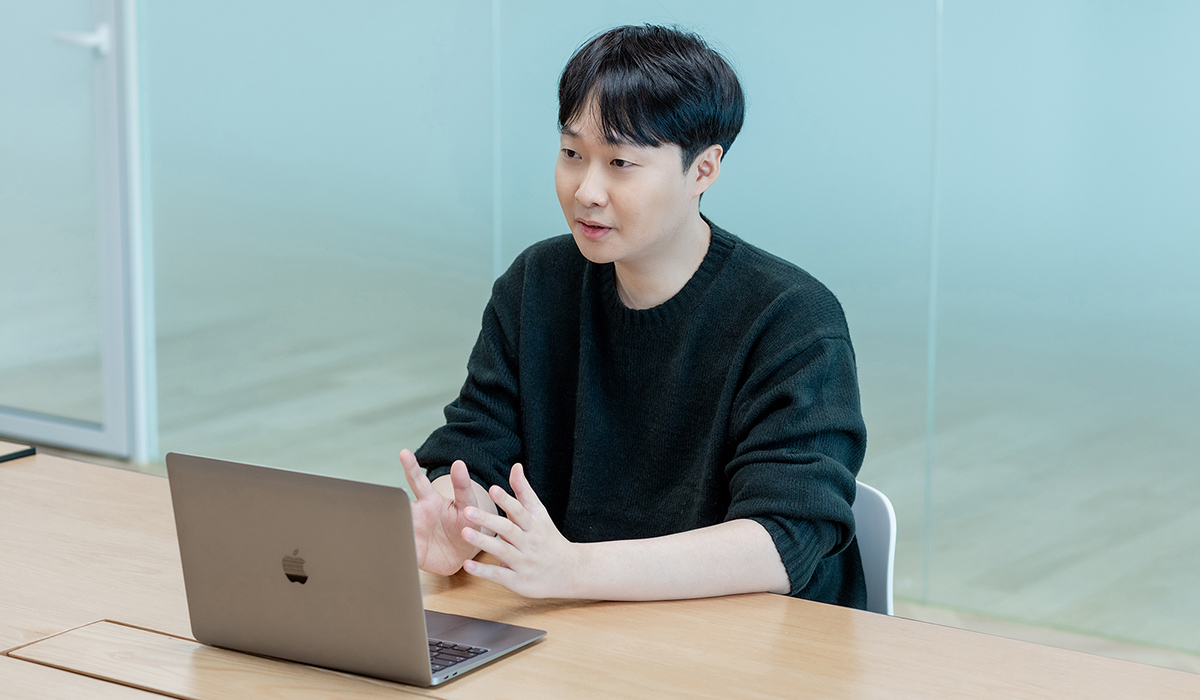Aiming to be a leader in the Web3 industry: Unlocking the potential of DOSI's recent reorganization

Update as of June 30, 2025:
DOSI will terminate all services on Tuesday, December 30, 2025, at 11:00 AM.
As of Tuesday, June 30, 2025, at 11:00 AM, DOSI has been removed from app stores and is no longer available for download.
For more details, please visit
Services for LINE NFT, the NFT marketplace aimed at users in Japan, and the NFT wallet known as DOSI Wallet, both previously operated by LINE Xenesis Inc.(*1), have ended. Replacing them, LINE NEXT Inc.(*2) has launched the digital commerce platform DOSI, now available in 180 countries, including Japan, as of January 10. We spoke to Kim Woosuk, a Business Director for LINE NEXT Inc., regarding the behind the scenes decisions leading up to the DOSI's reorganization, its features and strengths, and the company's focus on expanding its Web3 business.
*1 An LY Corporation group company that manages a crypto asset business.
*2 An LY Corporation group company that manages a Web3 platform (digital commerce) business.

- Kim Woosuk
LINE NEXT Inc. Business Director/LINE TECH PLUS PTE. LTD. CEO
After graduating from the School of Business at Yonsei University in Korea, Kim Woosuk founded a legwear commerce company.
Afterwards, he co-founded the fintech company Sentbe as a business specialist in the fintech field, which provided a foreign exchange service based on blockchain technology. In 2018, Kim Woosuk became an initial member of LINE Blockchain, developing LINE's proprietary crypto asset and blockchain business. He is currently serving as the CSO of LINE NEXT and as a Director of the Finschia Foundation.
Starting as an investment vehicle to the enjoyment of digital items phase
――Tell us about the current state of the Web3 NFT market.
First, allow me to explain the definitions of the terms Web3 and NFT. We think of Web3 as a "digital service environment that maximizes user rights and profits." Looking back at the history of digital technology, there's been a trend of strengthening users' rights concerning digital assets. We believe that Web3 will further accelerate these changes.
Furthermore, blockchain technology plays a significant role in Web3 and is considered the most efficient method for transparently recording ownership of digital assets. If Web3 is the environment that maximizes user rights and profits, then the blockchain is the foundational technology that supports those rights and profits. And then there are NFTs (short for Non-Fungible Tokens) which are particularly important within blockchain technology and are considered to play a central role in expanding Web3. NFTs clarify the ownership of digital assets, and it is expected that this will allow users to freely engage in economic activities.
The initial NFT market was dominated by transactions for investment purposes. Most sellers and buyers were cryptocurrency-related companies and investors, and by 2022, the average price of one item was over USD 400. However, while the average price dropped to around USD 80 and the total market transaction value decreased in 2023, yet the number of transactions increased by more than 40%. The initial investment-driven transactions have diminished, and the number of general users purely enjoying digital items has increased. Moving forward, we expect this market for general users to expand further, eventually reaching an annual transaction market of 20 trillion yen, growing to about 40% of the mobile in-app payment market.
Expanding the service for general users to accelerating its break into the mainstream
――Could you tell us about the behind the scenes decisions and features that led up to DOSI's reorganization?
The global NFT platform DOSI, launched as a beta version in September 2022, quickly gained a significant user base, with over 5.5 million registered accounts and more than 600,000 transactions within just 18 months of its launch. However, as the service evolved, we observed that many users were investors, leading to a higher average transaction price per person. Recognizing the ongoing demand for users' rights and the need to make Web3 and NFT technologies more accessible to the general public to facilitate growth--essentially, "making it mainstream"--DOSI has released its official version, building on the success achieved during its beta phase.
To make it easier for general users unfamiliar with NFTs to understand, DOSI's official release doesn't use the term "NFT market" but defines it as "digital commerce." Furthermore, we have removed the word "NFT" from the Terms of Use and the service UI, releasing it with more relatable terms such as "game items," "memberships," and "tickets."
Other key points are that it's as easy to sign up, log in, trade, and pay as it is on commonly used e-commerce sites. We aim to realize a digital commerce service where trading digital items can be done as casually and enjoyably as shopping on any e-commerce site.


In addition to the existing web service, mobile apps for iOS and Android are also available. Users can make purchases and transactions with not just Japanese but global brands.
――What has changed and what are some of the feedbacks since the official release of DOSI?
Since the official release of DOSI, we've experienced steady growth; however, the most significant change compared to the beta phase is in our user demographic. During the beta, over 90% of NFT sellers were cryptocurrency-related startups. Now, with the official release, approximately 70% of sellers come from general gaming companies, IP companies, and ticket-related businesses that are not directly related to cryptocurrencies or NFTs, and a wide range of digital items are being developed and sold.
Additionally, while over 90% of purchasers were previously cryptocurrency investors, we discovered that more than 50% of the users who bought items in the first month following the release were new to the platform. These changes suggest an increasing number of users are interested in digital items for reasons beyond investment, and we believe it is crucial to continue expanding our digital item offerings to the general user base.

――Could you tell us what are the key points that you are particularly focusing on with the official release of DOSI?
In particular, we are focusing primarily on game items among various types of content. There is a significant demand from gamers for transparency regarding game items and the ownership of the items they possess.
Until now, gaming companies have not adequately managed the items and ownership rights held by gamers, leading to the circulation of many game items on the black market. The estimated trading volume for item trading on the black market alone exceeds 1 trillion yen worldwide. However, due to the inability of sellers to reliably prove ownership of these items, issues such as widespread fraud and complex transactions have emerged. For gaming companies, challenges include not profiting from black market transactions and being unable to leverage data from dedicated users who purchase game items through secondary sales.
We believe the DOSI platform solves problems like fraud and complicated transactions because it records the distribution process and ownership history of items on the blockchain. Gaming companies can also earn a portion of the fees generated from secondary sales on the DOSI platform as revenue, allowing them to earn more each time secondary sales become more active. We're also working on utilizing user data for marketing purposes and offering benefits.
By providing value that meets the needs of both gamers and gaming companies, we can help expand the gaming industry and its content. Moreover, we believe this approach can solve problems not only in the gaming field but also for memberships and other digital items for both users and sellers.
Moving forward, we are preparing to collaborate with existing LY Corporation services such as "LINE Rangers" and "LINE Stickers", and to enable secondary sales of game items and stickers as NFTs on DOSI.

Aiming to be a leader in the Web3 industry
――Tell us about your focus on making Web3 mainstream and becoming a leader in the Web3 industry.
To push Web3 into the mainstream, I think we need to avoid using terms like "Web3," "blockchain," and "NFTs."
In addition to focusing on and updating our current content, we will further research the value each piece of content brings to users, what experiences and benefits they seek, and expand our offerings to content that more users can enjoy.
While there are currently about 4 million mobile apps worldwide, the number of blockchain-related apps hasn't even reached 100,000. Blockchain is considered a foundational technology that can transform the economy and the rights within services, which is why its widespread adoption is taking time. To accelerate the mainstream adoption of Web3, Web2 companies that already have a large market and Web2 users need to enter the Web3 space. We're also focusing on developing technologies and content that will be embraced by existing Web2 companies and users.
LINE NEXT received an investment of approximately 20 billion yen from the private equity firm Crescendo last December(*3) and is expected to lead the mainstream adoption of Web3. To meet these expectations, we are committed to continuing to create content that is valuable for our users, and I firmly believe that LINE NEXT will lead the world of Web3.
*3 LINE NEXT Raises USD140 Million to Expand Web3 Ecosystem

Related Links:
Interview date: February 22, 2024
Note: The information covered in this article is current as of the interview date.

- About The LY Corporation Story
- Making daily life more convenient and exciting for everyone.
As our corporate blog, The LY Corporation Story will share the inside story behind the challenges that we take on to create WOW! as well as the thoughts and feelings behind them.


